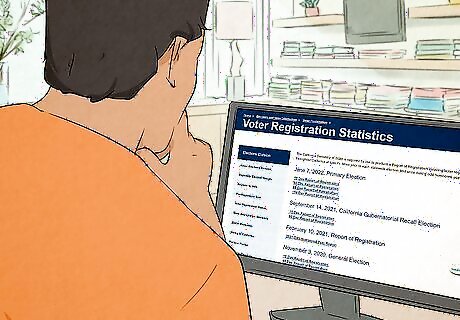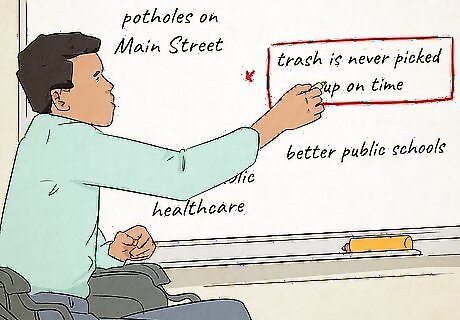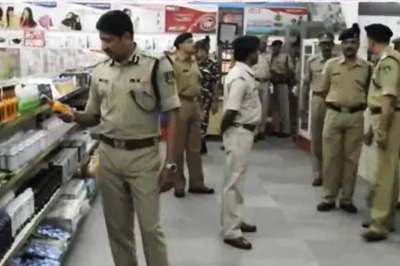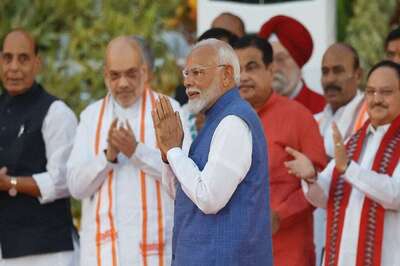
views
Choose a race without a lot of competition.

A first race is more manageable without cutthroat competition. Your best bet? Run unopposed! But that's not usually going to be possible. Look for a race with the least competition, and maybe only one person running. But if there's a local favorite running who got 90% of the vote in the last election, choose another race. Look for races where the incumbent barely got enough votes to win in the last election. Experienced politicians who are used to running unopposed might be in coast mode. In a race like that, you have the chance to gain momentum and take your opponent by surprise.
Register your candidacy to comply with local campaign laws.

Register to certify you meet the requirements for office. Elected offices typically don't require you to have any particular background, education, or experience in politics. There are usually age and residency requirements, but beyond that? Passion, commitment, and the willingness to work hard will serve you better than anything else. In the US, use the U.S. Vote Foundation website to easily find the location and contact information for your local election office. They'll have information about available offices and the duties those offices require. For some elections, you have to gather a specific number of signatures from voters before you qualify for candidacy. The people who sign aren't necessarily saying they'll vote for you, just that they think you should run. There are also many nonprofit organizations, such as Victory Fund, Vote Run Lead, and League of Women Voters, that provide guidance and resources to people running for office.
Build an experienced and committed campaign team.

Find someone with experience to be your campaign manager. Your campaign manager needs to really know what they're doing and how to get your campaign off the ground—anyone else can be taught. If you can only afford to hire one person, hire an experienced campaign manager. Then, they can help you set up your team. Never turn down any offers to help! You can find something for anyone to do who wants to get involved. Here are some key roles you'll probably need to find people to fill: Campaign finance: look for an accountant or someone who has experience handling and managing money, as well as an impeccable reputation for honesty Volunteer coordinator: this person needs experience managing a diverse group of people in a number of different settings—someone with experience in event planning would be great Communications director: someone with experience working with all different types of media, especially social media, who can coordinate your message across multiple platforms, as well as schedule press conferences and interviews and handle media requests for access General secretary or administrative assistant: someone who handles the day-to-day operations of your campaign office, including fielding phone calls, sorting mail, and managing appointments
Set a budget for your campaign.

Research the cost of campaign materials so you know how much you'll need. Signs, T-shirts, digital ads, direct mail, printing fliers, bumper stickers—everything costs money. Start with ballpark estimates for all the things you'll need so you can figure out how much money you need to raise. Reach out to nonprofit organizations as well as previous candidates to get a good idea of how much money you'll need. Nonprofits might also provide some materials free of charge—you never know unless you ask! Your local election office will have budgetary information for every candidate in previous elections, so you can look at that as well.
Develop a fundraising plan.

Raise money early to gauge the voters' reception of your candidacy. How many people are willing to give you money—even if it's only a few bucks—will tell you a lot about how many people will be willing to vote for you come election day. When you hold a fundraising event, that also gives you the opportunity to meet with and talk to potential voters. Set up booths at local community events as well as hold your own events. A public picnic in a local park that's also a fundraiser is a great way to raise money as well as awareness and really gets the community involved. Even if you have enough private money to fund your campaign, you still want to fundraise. Asking for money means you have to talk to voters, and voters who donate to your campaign are more likely to vote for you.
Learn as much as you can about your district.

Look at population demographics and voting history. All of this information will help you plan your campaign strategy because you can figure out who you need to persuade. The demographic makeup of your district also tells you what type of person you need to appeal to. Think about what those people are interested in and what they like—that'll help you decide on your approach and the overall look of your campaign. For example, if you have a suburban district made up of families, you would want to craft a campaign that appealed to families and make sure all of your events were family-friendly. You might even offer special events for kids! As another example, if your district is in a hip, urban area made up mostly of 20-something singles, you might hold campaign events at the local bar or have a free concert in the park.
Zero in on a problem you can solve.

Lean in on issues over personality or qualifications. It's safe to assume that both you and your opponent are qualified for office and likable enough to think you can get people to vote for you. To win the election, tell the voters how you're going to solve a problem that matters to them. Finding out what matters to voters will help you identify the most pressing problems they face. It could be the potholes on Main Street or the fact that the trash is never picked up on time. Position yourself as the candidate who cares about this problem and is going to solve it. Depending on the office you're running for, it's possible you'll have multiple issues. For example, a mayor is responsible for a lot of different areas, while a school board member only has to worry about the public schools.
Craft a short and sweet campaign slogan.

Use a slogan that embodies your reason for running. Organize your entire campaign around this slogan. All your speeches, your answers in interviews, your campaign swag— literally everything that has anything to do with your campaign—center around this slogan. Consistent messaging makes it easier for voters to remember you and helps pave your path to victory. Try to keep your slogan to a few words—something you can easily print on signs and T-shirts. For example, if you're running for the local school board, your slogan might be "For the Children." Great slogans are often a play on your name or use a literary device, such as rhyming or alliteration, to make them more memorable. For example, someone named Corey might run for city council using the slogan "Corey Cares."
Buddy up with a popular incumbent.

Link your campaign with an experienced candidate running for another office. With this strategy, you and the other candidate present yourselves as a package deal. You might make appearances together and create signage that presents your campaigns as joined. This allows you to capitalize on the other candidate's supporters. You and the other candidate don't have to agree on everything, but you should agree on the major issues that are central to your campaign. You'll get a lot more name recognition this way because the public will come to associate your name with theirs. If your names happen to rhyme or start with the same letter, even better!
Start your campaign as early as possible.

Check your local campaign laws to find out when you can start campaigning. If this is your first race and you're not coming out of the gate with a big budget, starting early gives you more runway to meet and surpass your vote goal. Get voter data from your local elections office and focus initially on people who are likely to vote for you—not people that you would have to convince or persuade. Even if it's too early for official campaign activities, you can still put your online presence in place, poll voters, build a mailing list, and do other things that will give your campaign momentum out of the gate. Focusing on likely votes early also gives you the opportunity to recruit those people as volunteers for your campaign effort.
Put yard signs in high-traffic areas.

Use yard signs to increase your name recognition. Check local regulations, then put your signs out as early as possible. Your signs are more likely to get noticed if they're the first signs out there. Keep your signs simple and consistent. Decide on a couple of colors, a font, and maybe a logo. Then, maintain those elements in all of your signage as well as stickers, T-shirts, and other campaign swag.
Prioritize face-to-face contact with voters.

Get to know your community and show that you care. It's a lot easier to persuade someone to vote for you in person. If they feel like you know them personally and really listened to what you had to say, they'll want to have you representing them in government. Volunteers can help you out with this by knocking on doors and talking to voters as well, but it's important that you get out there and mingle with your community. Community campaign events and town halls are a great way to talk to voters and show them that you care about the issues in the community. For example, you might hold a campaign event to pick up litter. Always pay attention to your physical appearance. Even if you're not at an official event, you might still be in a position to meet and talk to voters—make sure you're somebody they'd want to talk to!
Build a robust social media presence.

Get verified accounts on Facebook, Twitter, and Instagram. These are the big three where you'll potentially have access to the most voters, although each has a slightly different demographic. Then, add other platforms that might benefit your campaign. For example, if you're trying to attract younger voters, you'll most likely want to start a TikTok account. In addition to social media, you'll also want a basic website that will serve as your online base of operations. Make sure you have prominent donation buttons!
Court influencers as vocal supporters.

Enlist the help of people who already have large networks. You might be most familiar with the "influencer" title on social media, but influencers exist offline as well. Identify the people in your community who seem to know everybody and who people look up to—those are the people you want on your side. Powerful people in your community can really make or break your campaign. Make sure you get their support early—they can help you achieve your goals. If there's an influencer in your community who's against your campaign, figure out why. Usually, it's because your position on an important local issue would have a negative effect on that person's bottom line.
Emphasize your stance on issues people care about.

Use every opportunity to reinforce what you'll do for the community. Build on your slogan to write campaign speeches that tells voters about the problem or problems you've identified in the community and how you plan to solve them. Make it clear that you're the right person to take on this issue and that your solution will make people's lives better. Present yourself as a fellow community member who's passionate about improving people's daily lives. Voters tend to respond well to this.
Earn media coverage with newsworthy events.

News coverage of your campaign is always better than advertising. Local news channels often say they're reporting news that matters to members of the community—use that to your advantage. Local voters will see that you're taking action to fight for local issues and be more inclined to vote for you. Keep in mind that you can't expect the news to cover your campaign just because you're running. You need to host newsworthy events. Talking to people with journalism experience can help you figure out how to make your events more likely to be covered. Often, political candidates drive themselves into debt with expensive TV ads that don't really nudge the needle in terms of persuading voters. Don't feel like you have to make a bunch of TV ads just because your opponent is doing it.
Mobilize your supporters to go to the polls.

Shift your focus to getting out the vote in the last 2 weeks. Follow up with everyone who has indicated they support you and remind them to go to the polls. Send out emails or texts with reminders as well. When you follow up with supporters, if they say they're not planning to go vote, find out why. If it's something your campaign can help with, offer to do so. For example, you might rent vans and offer free rides.


















Comments
0 comment